Research on Early Childhood Studies: Factors & Parental Involvement
VerifiedAdded on 2023/06/14
|17
|4443
|190
Report
AI Summary
This report provides an overview of early childhood studies, emphasizing the critical role of early childhood education in shaping a child's development and future. It discusses the importance of parental involvement, family structures, and community practices such as nutrition and healthcare in fostering holistic growth. The literature review highlights the impact of high-quality education and positive parental behavior on a child's learning and school readiness. The report also addresses challenges faced by modern families, including working parents, single-parent households, and the effects of divorce on children. It concludes by advocating for increased parental engagement in schools and at home to support children's academic and personal development. Desklib offers a range of solved assignments and past papers for students.
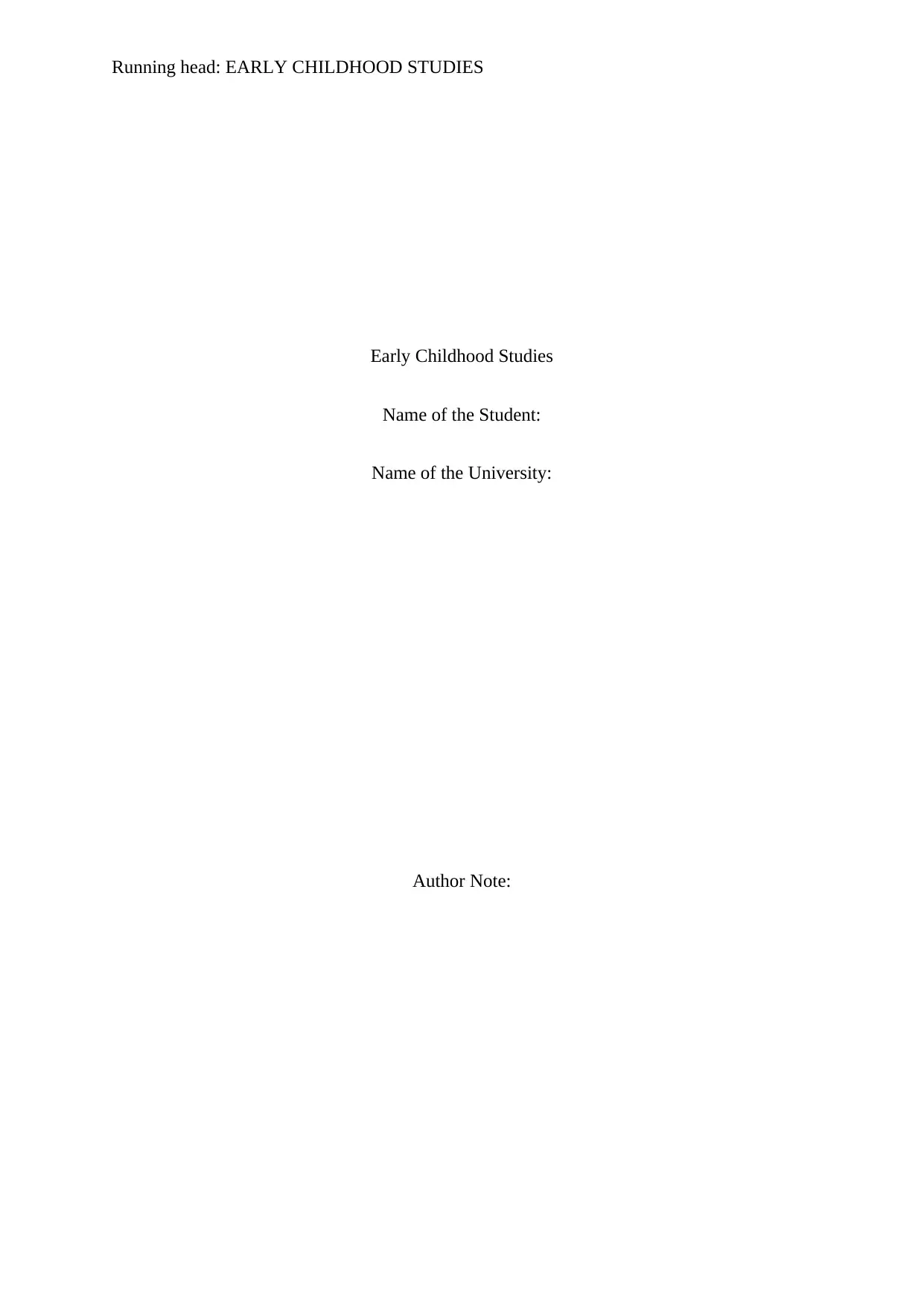
Running head: EARLY CHILDHOOD STUDIES
Early Childhood Studies
Name of the Student:
Name of the University:
Author Note:
Early Childhood Studies
Name of the Student:
Name of the University:
Author Note:
Paraphrase This Document
Need a fresh take? Get an instant paraphrase of this document with our AI Paraphraser
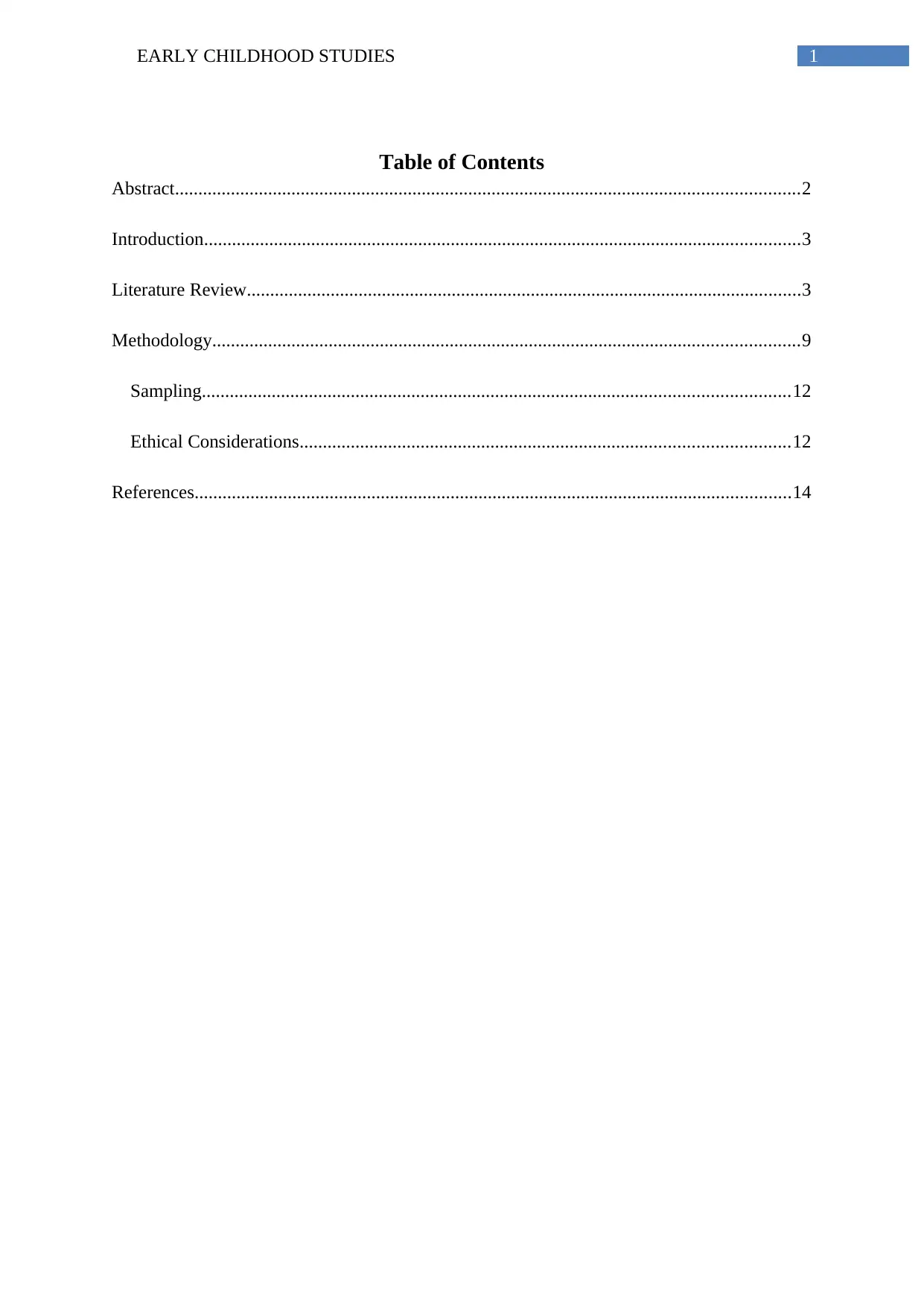
1EARLY CHILDHOOD STUDIES
Table of Contents
Abstract......................................................................................................................................2
Introduction................................................................................................................................3
Literature Review.......................................................................................................................3
Methodology..............................................................................................................................9
Sampling..............................................................................................................................12
Ethical Considerations.........................................................................................................12
References................................................................................................................................14
Table of Contents
Abstract......................................................................................................................................2
Introduction................................................................................................................................3
Literature Review.......................................................................................................................3
Methodology..............................................................................................................................9
Sampling..............................................................................................................................12
Ethical Considerations.........................................................................................................12
References................................................................................................................................14
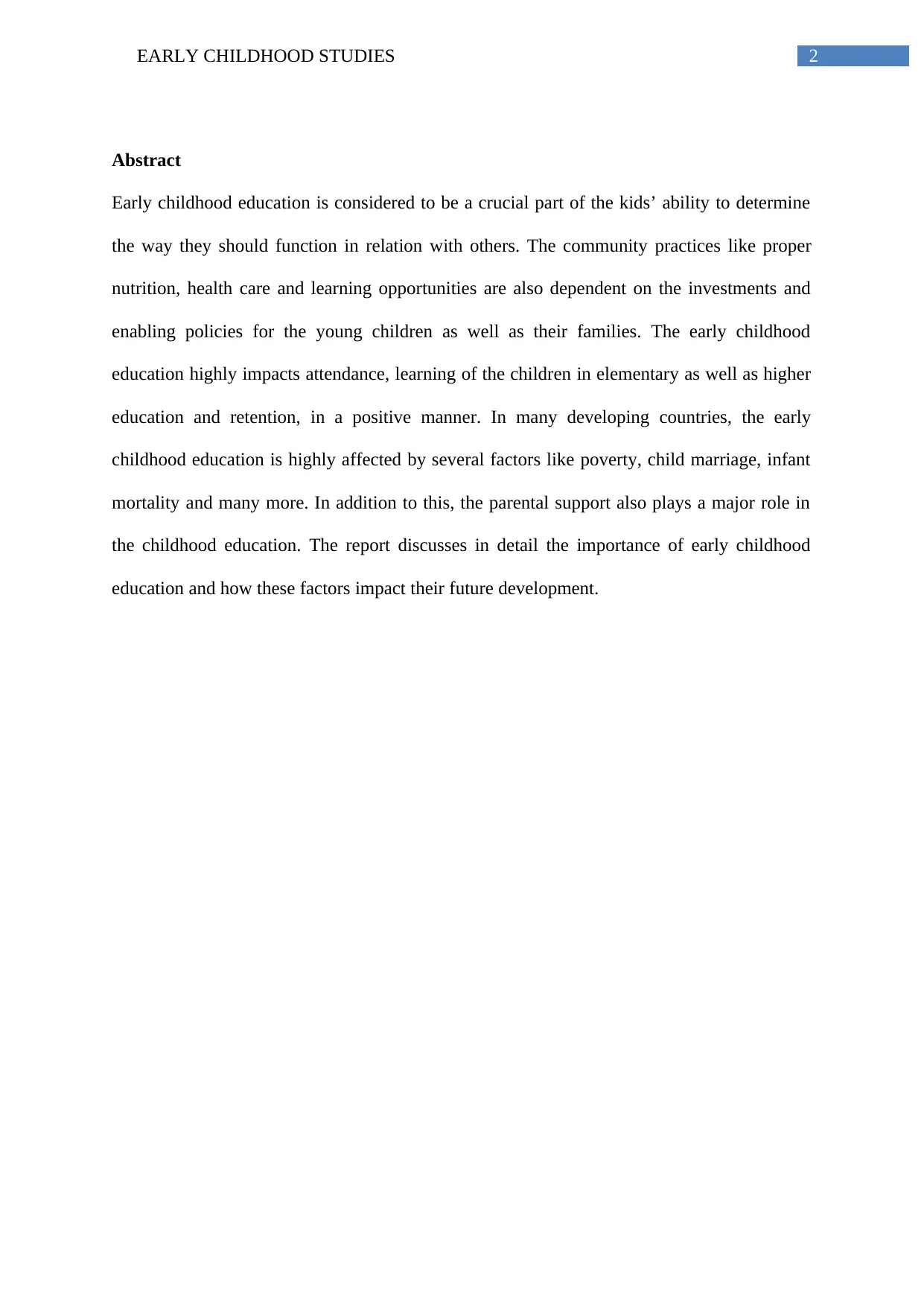
2EARLY CHILDHOOD STUDIES
Abstract
Early childhood education is considered to be a crucial part of the kids’ ability to determine
the way they should function in relation with others. The community practices like proper
nutrition, health care and learning opportunities are also dependent on the investments and
enabling policies for the young children as well as their families. The early childhood
education highly impacts attendance, learning of the children in elementary as well as higher
education and retention, in a positive manner. In many developing countries, the early
childhood education is highly affected by several factors like poverty, child marriage, infant
mortality and many more. In addition to this, the parental support also plays a major role in
the childhood education. The report discusses in detail the importance of early childhood
education and how these factors impact their future development.
Abstract
Early childhood education is considered to be a crucial part of the kids’ ability to determine
the way they should function in relation with others. The community practices like proper
nutrition, health care and learning opportunities are also dependent on the investments and
enabling policies for the young children as well as their families. The early childhood
education highly impacts attendance, learning of the children in elementary as well as higher
education and retention, in a positive manner. In many developing countries, the early
childhood education is highly affected by several factors like poverty, child marriage, infant
mortality and many more. In addition to this, the parental support also plays a major role in
the childhood education. The report discusses in detail the importance of early childhood
education and how these factors impact their future development.
⊘ This is a preview!⊘
Do you want full access?
Subscribe today to unlock all pages.

Trusted by 1+ million students worldwide
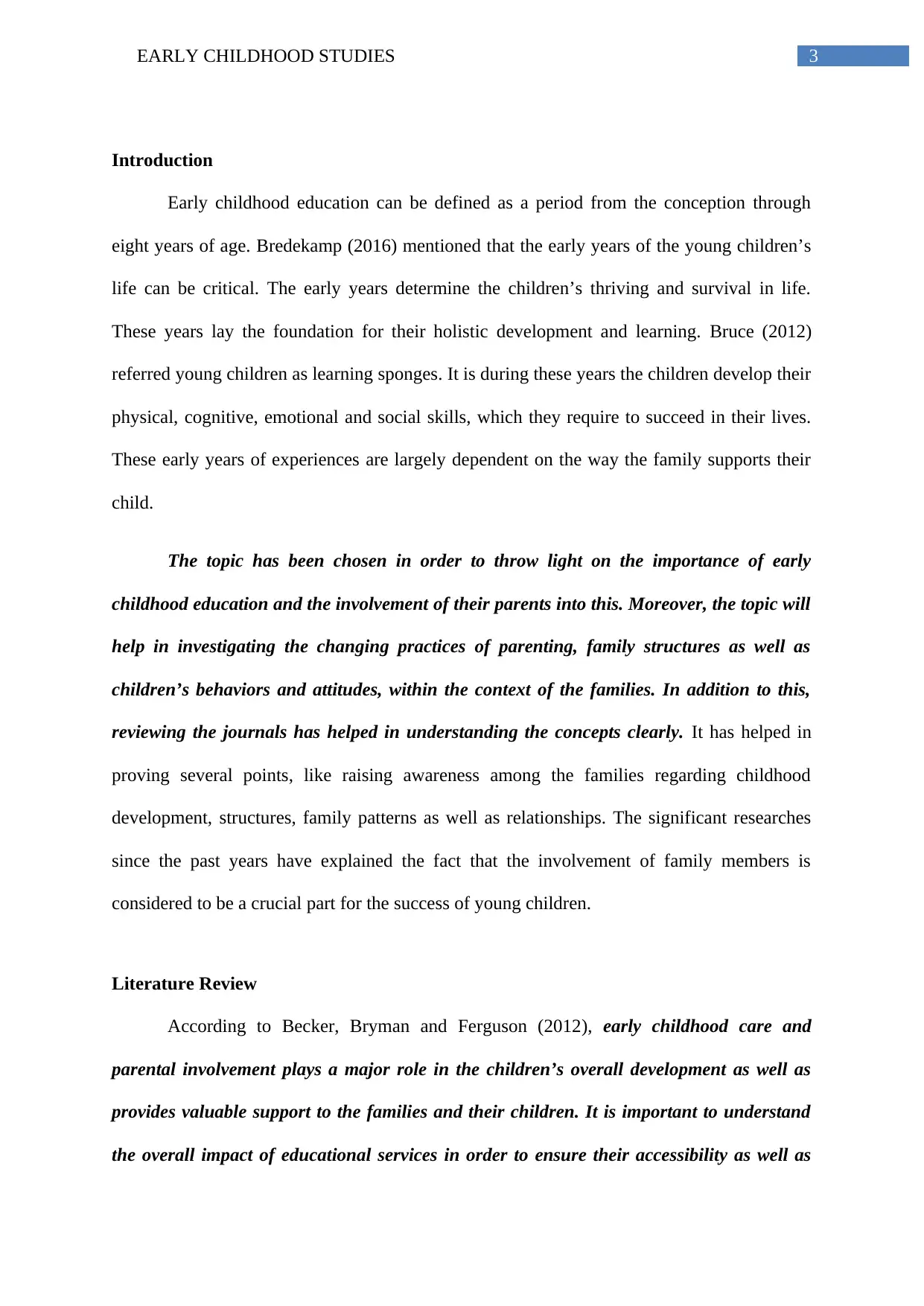
3EARLY CHILDHOOD STUDIES
Introduction
Early childhood education can be defined as a period from the conception through
eight years of age. Bredekamp (2016) mentioned that the early years of the young children’s
life can be critical. The early years determine the children’s thriving and survival in life.
These years lay the foundation for their holistic development and learning. Bruce (2012)
referred young children as learning sponges. It is during these years the children develop their
physical, cognitive, emotional and social skills, which they require to succeed in their lives.
These early years of experiences are largely dependent on the way the family supports their
child.
The topic has been chosen in order to throw light on the importance of early
childhood education and the involvement of their parents into this. Moreover, the topic will
help in investigating the changing practices of parenting, family structures as well as
children’s behaviors and attitudes, within the context of the families. In addition to this,
reviewing the journals has helped in understanding the concepts clearly. It has helped in
proving several points, like raising awareness among the families regarding childhood
development, structures, family patterns as well as relationships. The significant researches
since the past years have explained the fact that the involvement of family members is
considered to be a crucial part for the success of young children.
Literature Review
According to Becker, Bryman and Ferguson (2012), early childhood care and
parental involvement plays a major role in the children’s overall development as well as
provides valuable support to the families and their children. It is important to understand
the overall impact of educational services in order to ensure their accessibility as well as
Introduction
Early childhood education can be defined as a period from the conception through
eight years of age. Bredekamp (2016) mentioned that the early years of the young children’s
life can be critical. The early years determine the children’s thriving and survival in life.
These years lay the foundation for their holistic development and learning. Bruce (2012)
referred young children as learning sponges. It is during these years the children develop their
physical, cognitive, emotional and social skills, which they require to succeed in their lives.
These early years of experiences are largely dependent on the way the family supports their
child.
The topic has been chosen in order to throw light on the importance of early
childhood education and the involvement of their parents into this. Moreover, the topic will
help in investigating the changing practices of parenting, family structures as well as
children’s behaviors and attitudes, within the context of the families. In addition to this,
reviewing the journals has helped in understanding the concepts clearly. It has helped in
proving several points, like raising awareness among the families regarding childhood
development, structures, family patterns as well as relationships. The significant researches
since the past years have explained the fact that the involvement of family members is
considered to be a crucial part for the success of young children.
Literature Review
According to Becker, Bryman and Ferguson (2012), early childhood care and
parental involvement plays a major role in the children’s overall development as well as
provides valuable support to the families and their children. It is important to understand
the overall impact of educational services in order to ensure their accessibility as well as
Paraphrase This Document
Need a fresh take? Get an instant paraphrase of this document with our AI Paraphraser
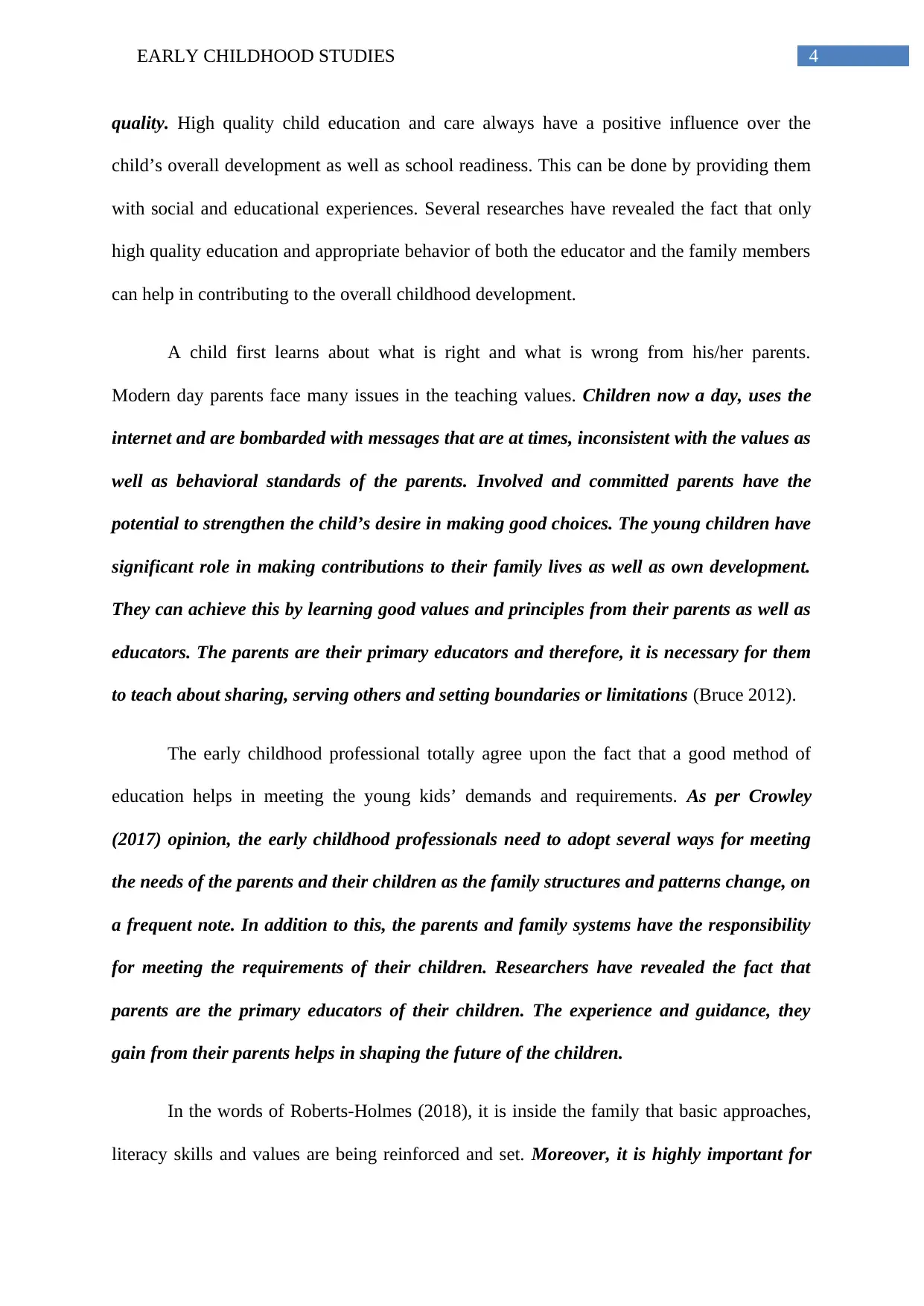
4EARLY CHILDHOOD STUDIES
quality. High quality child education and care always have a positive influence over the
child’s overall development as well as school readiness. This can be done by providing them
with social and educational experiences. Several researches have revealed the fact that only
high quality education and appropriate behavior of both the educator and the family members
can help in contributing to the overall childhood development.
A child first learns about what is right and what is wrong from his/her parents.
Modern day parents face many issues in the teaching values. Children now a day, uses the
internet and are bombarded with messages that are at times, inconsistent with the values as
well as behavioral standards of the parents. Involved and committed parents have the
potential to strengthen the child’s desire in making good choices. The young children have
significant role in making contributions to their family lives as well as own development.
They can achieve this by learning good values and principles from their parents as well as
educators. The parents are their primary educators and therefore, it is necessary for them
to teach about sharing, serving others and setting boundaries or limitations (Bruce 2012).
The early childhood professional totally agree upon the fact that a good method of
education helps in meeting the young kids’ demands and requirements. As per Crowley
(2017) opinion, the early childhood professionals need to adopt several ways for meeting
the needs of the parents and their children as the family structures and patterns change, on
a frequent note. In addition to this, the parents and family systems have the responsibility
for meeting the requirements of their children. Researchers have revealed the fact that
parents are the primary educators of their children. The experience and guidance, they
gain from their parents helps in shaping the future of the children.
In the words of Roberts-Holmes (2018), it is inside the family that basic approaches,
literacy skills and values are being reinforced and set. Moreover, it is highly important for
quality. High quality child education and care always have a positive influence over the
child’s overall development as well as school readiness. This can be done by providing them
with social and educational experiences. Several researches have revealed the fact that only
high quality education and appropriate behavior of both the educator and the family members
can help in contributing to the overall childhood development.
A child first learns about what is right and what is wrong from his/her parents.
Modern day parents face many issues in the teaching values. Children now a day, uses the
internet and are bombarded with messages that are at times, inconsistent with the values as
well as behavioral standards of the parents. Involved and committed parents have the
potential to strengthen the child’s desire in making good choices. The young children have
significant role in making contributions to their family lives as well as own development.
They can achieve this by learning good values and principles from their parents as well as
educators. The parents are their primary educators and therefore, it is necessary for them
to teach about sharing, serving others and setting boundaries or limitations (Bruce 2012).
The early childhood professional totally agree upon the fact that a good method of
education helps in meeting the young kids’ demands and requirements. As per Crowley
(2017) opinion, the early childhood professionals need to adopt several ways for meeting
the needs of the parents and their children as the family structures and patterns change, on
a frequent note. In addition to this, the parents and family systems have the responsibility
for meeting the requirements of their children. Researchers have revealed the fact that
parents are the primary educators of their children. The experience and guidance, they
gain from their parents helps in shaping the future of the children.
In the words of Roberts-Holmes (2018), it is inside the family that basic approaches,
literacy skills and values are being reinforced and set. Moreover, it is highly important for
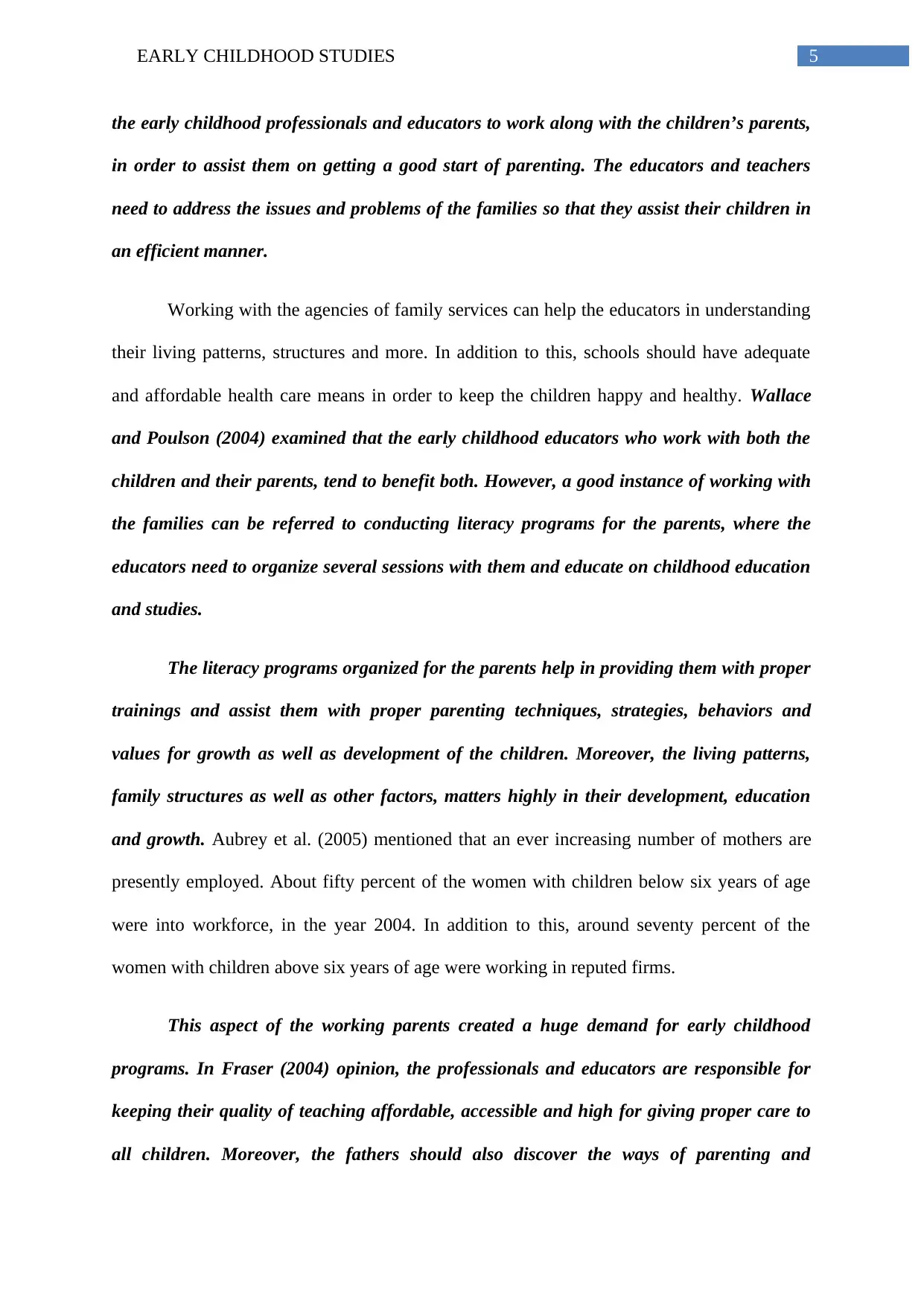
5EARLY CHILDHOOD STUDIES
the early childhood professionals and educators to work along with the children’s parents,
in order to assist them on getting a good start of parenting. The educators and teachers
need to address the issues and problems of the families so that they assist their children in
an efficient manner.
Working with the agencies of family services can help the educators in understanding
their living patterns, structures and more. In addition to this, schools should have adequate
and affordable health care means in order to keep the children happy and healthy. Wallace
and Poulson (2004) examined that the early childhood educators who work with both the
children and their parents, tend to benefit both. However, a good instance of working with
the families can be referred to conducting literacy programs for the parents, where the
educators need to organize several sessions with them and educate on childhood education
and studies.
The literacy programs organized for the parents help in providing them with proper
trainings and assist them with proper parenting techniques, strategies, behaviors and
values for growth as well as development of the children. Moreover, the living patterns,
family structures as well as other factors, matters highly in their development, education
and growth. Aubrey et al. (2005) mentioned that an ever increasing number of mothers are
presently employed. About fifty percent of the women with children below six years of age
were into workforce, in the year 2004. In addition to this, around seventy percent of the
women with children above six years of age were working in reputed firms.
This aspect of the working parents created a huge demand for early childhood
programs. In Fraser (2004) opinion, the professionals and educators are responsible for
keeping their quality of teaching affordable, accessible and high for giving proper care to
all children. Moreover, the fathers should also discover the ways of parenting and
the early childhood professionals and educators to work along with the children’s parents,
in order to assist them on getting a good start of parenting. The educators and teachers
need to address the issues and problems of the families so that they assist their children in
an efficient manner.
Working with the agencies of family services can help the educators in understanding
their living patterns, structures and more. In addition to this, schools should have adequate
and affordable health care means in order to keep the children happy and healthy. Wallace
and Poulson (2004) examined that the early childhood educators who work with both the
children and their parents, tend to benefit both. However, a good instance of working with
the families can be referred to conducting literacy programs for the parents, where the
educators need to organize several sessions with them and educate on childhood education
and studies.
The literacy programs organized for the parents help in providing them with proper
trainings and assist them with proper parenting techniques, strategies, behaviors and
values for growth as well as development of the children. Moreover, the living patterns,
family structures as well as other factors, matters highly in their development, education
and growth. Aubrey et al. (2005) mentioned that an ever increasing number of mothers are
presently employed. About fifty percent of the women with children below six years of age
were into workforce, in the year 2004. In addition to this, around seventy percent of the
women with children above six years of age were working in reputed firms.
This aspect of the working parents created a huge demand for early childhood
programs. In Fraser (2004) opinion, the professionals and educators are responsible for
keeping their quality of teaching affordable, accessible and high for giving proper care to
all children. Moreover, the fathers should also discover the ways of parenting and
⊘ This is a preview!⊘
Do you want full access?
Subscribe today to unlock all pages.

Trusted by 1+ million students worldwide
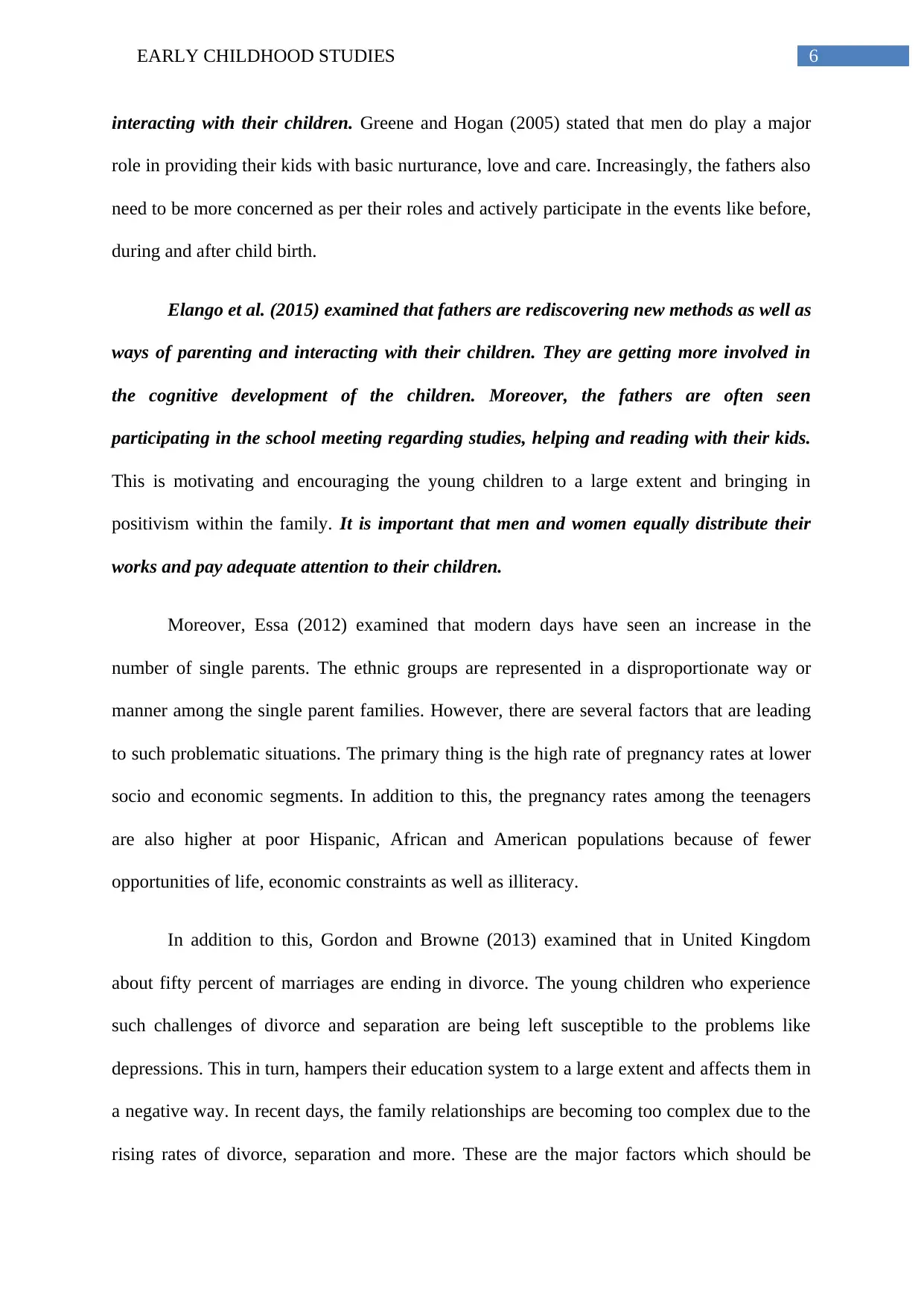
6EARLY CHILDHOOD STUDIES
interacting with their children. Greene and Hogan (2005) stated that men do play a major
role in providing their kids with basic nurturance, love and care. Increasingly, the fathers also
need to be more concerned as per their roles and actively participate in the events like before,
during and after child birth.
Elango et al. (2015) examined that fathers are rediscovering new methods as well as
ways of parenting and interacting with their children. They are getting more involved in
the cognitive development of the children. Moreover, the fathers are often seen
participating in the school meeting regarding studies, helping and reading with their kids.
This is motivating and encouraging the young children to a large extent and bringing in
positivism within the family. It is important that men and women equally distribute their
works and pay adequate attention to their children.
Moreover, Essa (2012) examined that modern days have seen an increase in the
number of single parents. The ethnic groups are represented in a disproportionate way or
manner among the single parent families. However, there are several factors that are leading
to such problematic situations. The primary thing is the high rate of pregnancy rates at lower
socio and economic segments. In addition to this, the pregnancy rates among the teenagers
are also higher at poor Hispanic, African and American populations because of fewer
opportunities of life, economic constraints as well as illiteracy.
In addition to this, Gordon and Browne (2013) examined that in United Kingdom
about fifty percent of marriages are ending in divorce. The young children who experience
such challenges of divorce and separation are being left susceptible to the problems like
depressions. This in turn, hampers their education system to a large extent and affects them in
a negative way. In recent days, the family relationships are becoming too complex due to the
rising rates of divorce, separation and more. These are the major factors which should be
interacting with their children. Greene and Hogan (2005) stated that men do play a major
role in providing their kids with basic nurturance, love and care. Increasingly, the fathers also
need to be more concerned as per their roles and actively participate in the events like before,
during and after child birth.
Elango et al. (2015) examined that fathers are rediscovering new methods as well as
ways of parenting and interacting with their children. They are getting more involved in
the cognitive development of the children. Moreover, the fathers are often seen
participating in the school meeting regarding studies, helping and reading with their kids.
This is motivating and encouraging the young children to a large extent and bringing in
positivism within the family. It is important that men and women equally distribute their
works and pay adequate attention to their children.
Moreover, Essa (2012) examined that modern days have seen an increase in the
number of single parents. The ethnic groups are represented in a disproportionate way or
manner among the single parent families. However, there are several factors that are leading
to such problematic situations. The primary thing is the high rate of pregnancy rates at lower
socio and economic segments. In addition to this, the pregnancy rates among the teenagers
are also higher at poor Hispanic, African and American populations because of fewer
opportunities of life, economic constraints as well as illiteracy.
In addition to this, Gordon and Browne (2013) examined that in United Kingdom
about fifty percent of marriages are ending in divorce. The young children who experience
such challenges of divorce and separation are being left susceptible to the problems like
depressions. This in turn, hampers their education system to a large extent and affects them in
a negative way. In recent days, the family relationships are becoming too complex due to the
rising rates of divorce, separation and more. These are the major factors which should be
Paraphrase This Document
Need a fresh take? Get an instant paraphrase of this document with our AI Paraphraser
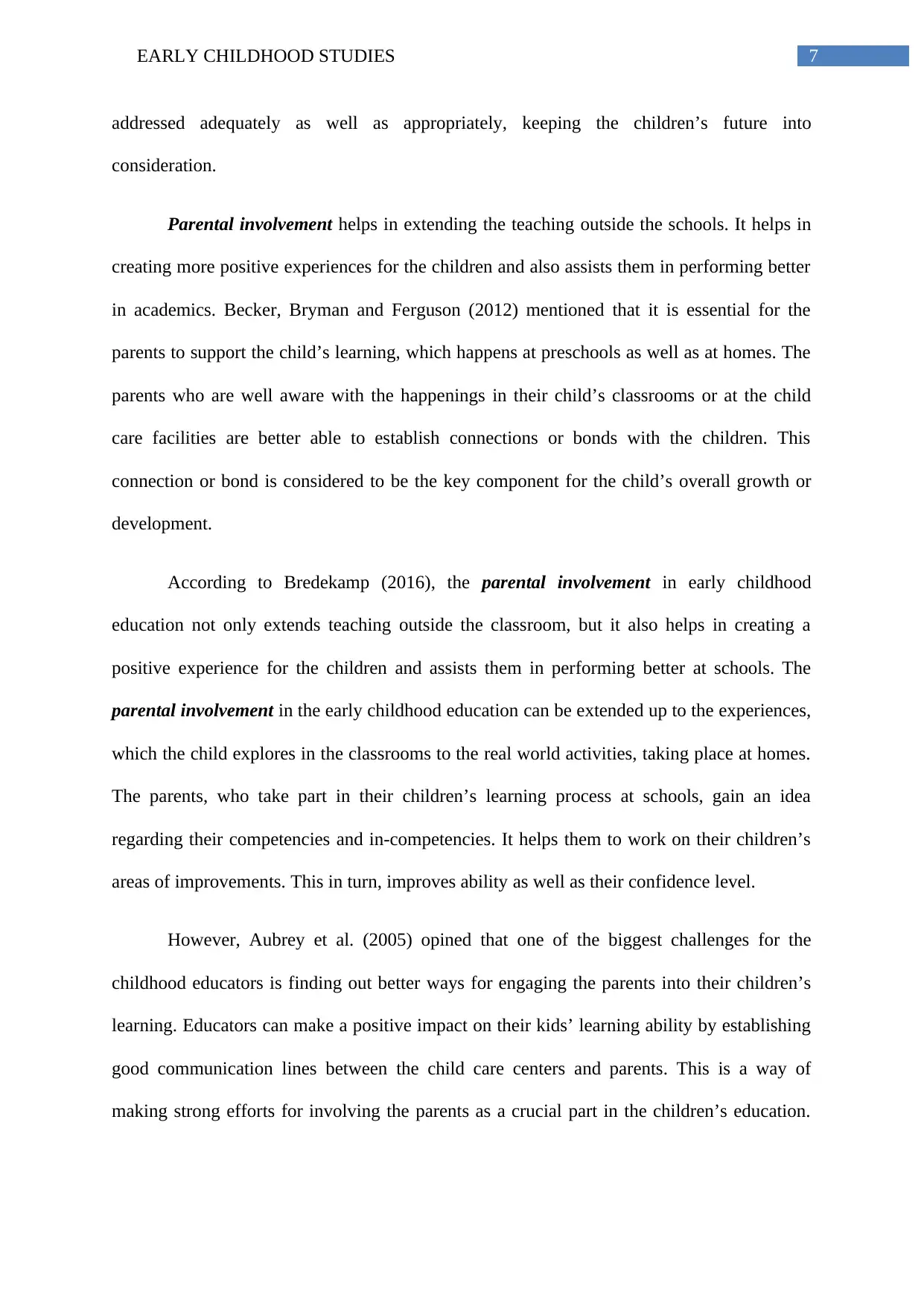
7EARLY CHILDHOOD STUDIES
addressed adequately as well as appropriately, keeping the children’s future into
consideration.
Parental involvement helps in extending the teaching outside the schools. It helps in
creating more positive experiences for the children and also assists them in performing better
in academics. Becker, Bryman and Ferguson (2012) mentioned that it is essential for the
parents to support the child’s learning, which happens at preschools as well as at homes. The
parents who are well aware with the happenings in their child’s classrooms or at the child
care facilities are better able to establish connections or bonds with the children. This
connection or bond is considered to be the key component for the child’s overall growth or
development.
According to Bredekamp (2016), the parental involvement in early childhood
education not only extends teaching outside the classroom, but it also helps in creating a
positive experience for the children and assists them in performing better at schools. The
parental involvement in the early childhood education can be extended up to the experiences,
which the child explores in the classrooms to the real world activities, taking place at homes.
The parents, who take part in their children’s learning process at schools, gain an idea
regarding their competencies and in-competencies. It helps them to work on their children’s
areas of improvements. This in turn, improves ability as well as their confidence level.
However, Aubrey et al. (2005) opined that one of the biggest challenges for the
childhood educators is finding out better ways for engaging the parents into their children’s
learning. Educators can make a positive impact on their kids’ learning ability by establishing
good communication lines between the child care centers and parents. This is a way of
making strong efforts for involving the parents as a crucial part in the children’s education.
addressed adequately as well as appropriately, keeping the children’s future into
consideration.
Parental involvement helps in extending the teaching outside the schools. It helps in
creating more positive experiences for the children and also assists them in performing better
in academics. Becker, Bryman and Ferguson (2012) mentioned that it is essential for the
parents to support the child’s learning, which happens at preschools as well as at homes. The
parents who are well aware with the happenings in their child’s classrooms or at the child
care facilities are better able to establish connections or bonds with the children. This
connection or bond is considered to be the key component for the child’s overall growth or
development.
According to Bredekamp (2016), the parental involvement in early childhood
education not only extends teaching outside the classroom, but it also helps in creating a
positive experience for the children and assists them in performing better at schools. The
parental involvement in the early childhood education can be extended up to the experiences,
which the child explores in the classrooms to the real world activities, taking place at homes.
The parents, who take part in their children’s learning process at schools, gain an idea
regarding their competencies and in-competencies. It helps them to work on their children’s
areas of improvements. This in turn, improves ability as well as their confidence level.
However, Aubrey et al. (2005) opined that one of the biggest challenges for the
childhood educators is finding out better ways for engaging the parents into their children’s
learning. Educators can make a positive impact on their kids’ learning ability by establishing
good communication lines between the child care centers and parents. This is a way of
making strong efforts for involving the parents as a crucial part in the children’s education.
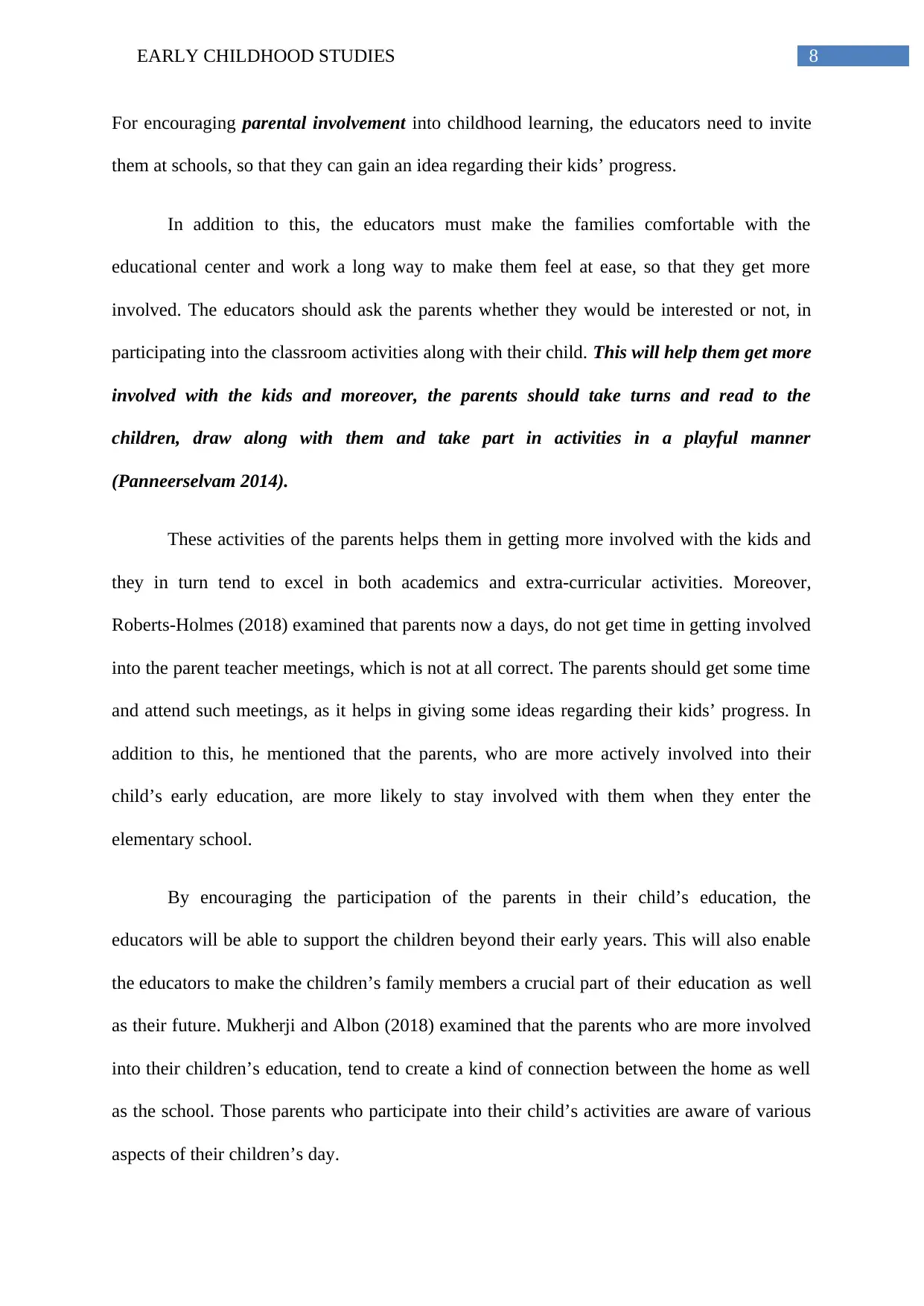
8EARLY CHILDHOOD STUDIES
For encouraging parental involvement into childhood learning, the educators need to invite
them at schools, so that they can gain an idea regarding their kids’ progress.
In addition to this, the educators must make the families comfortable with the
educational center and work a long way to make them feel at ease, so that they get more
involved. The educators should ask the parents whether they would be interested or not, in
participating into the classroom activities along with their child. This will help them get more
involved with the kids and moreover, the parents should take turns and read to the
children, draw along with them and take part in activities in a playful manner
(Panneerselvam 2014).
These activities of the parents helps them in getting more involved with the kids and
they in turn tend to excel in both academics and extra-curricular activities. Moreover,
Roberts-Holmes (2018) examined that parents now a days, do not get time in getting involved
into the parent teacher meetings, which is not at all correct. The parents should get some time
and attend such meetings, as it helps in giving some ideas regarding their kids’ progress. In
addition to this, he mentioned that the parents, who are more actively involved into their
child’s early education, are more likely to stay involved with them when they enter the
elementary school.
By encouraging the participation of the parents in their child’s education, the
educators will be able to support the children beyond their early years. This will also enable
the educators to make the children’s family members a crucial part of their education as well
as their future. Mukherji and Albon (2018) examined that the parents who are more involved
into their children’s education, tend to create a kind of connection between the home as well
as the school. Those parents who participate into their child’s activities are aware of various
aspects of their children’s day.
For encouraging parental involvement into childhood learning, the educators need to invite
them at schools, so that they can gain an idea regarding their kids’ progress.
In addition to this, the educators must make the families comfortable with the
educational center and work a long way to make them feel at ease, so that they get more
involved. The educators should ask the parents whether they would be interested or not, in
participating into the classroom activities along with their child. This will help them get more
involved with the kids and moreover, the parents should take turns and read to the
children, draw along with them and take part in activities in a playful manner
(Panneerselvam 2014).
These activities of the parents helps them in getting more involved with the kids and
they in turn tend to excel in both academics and extra-curricular activities. Moreover,
Roberts-Holmes (2018) examined that parents now a days, do not get time in getting involved
into the parent teacher meetings, which is not at all correct. The parents should get some time
and attend such meetings, as it helps in giving some ideas regarding their kids’ progress. In
addition to this, he mentioned that the parents, who are more actively involved into their
child’s early education, are more likely to stay involved with them when they enter the
elementary school.
By encouraging the participation of the parents in their child’s education, the
educators will be able to support the children beyond their early years. This will also enable
the educators to make the children’s family members a crucial part of their education as well
as their future. Mukherji and Albon (2018) examined that the parents who are more involved
into their children’s education, tend to create a kind of connection between the home as well
as the school. Those parents who participate into their child’s activities are aware of various
aspects of their children’s day.
⊘ This is a preview!⊘
Do you want full access?
Subscribe today to unlock all pages.

Trusted by 1+ million students worldwide
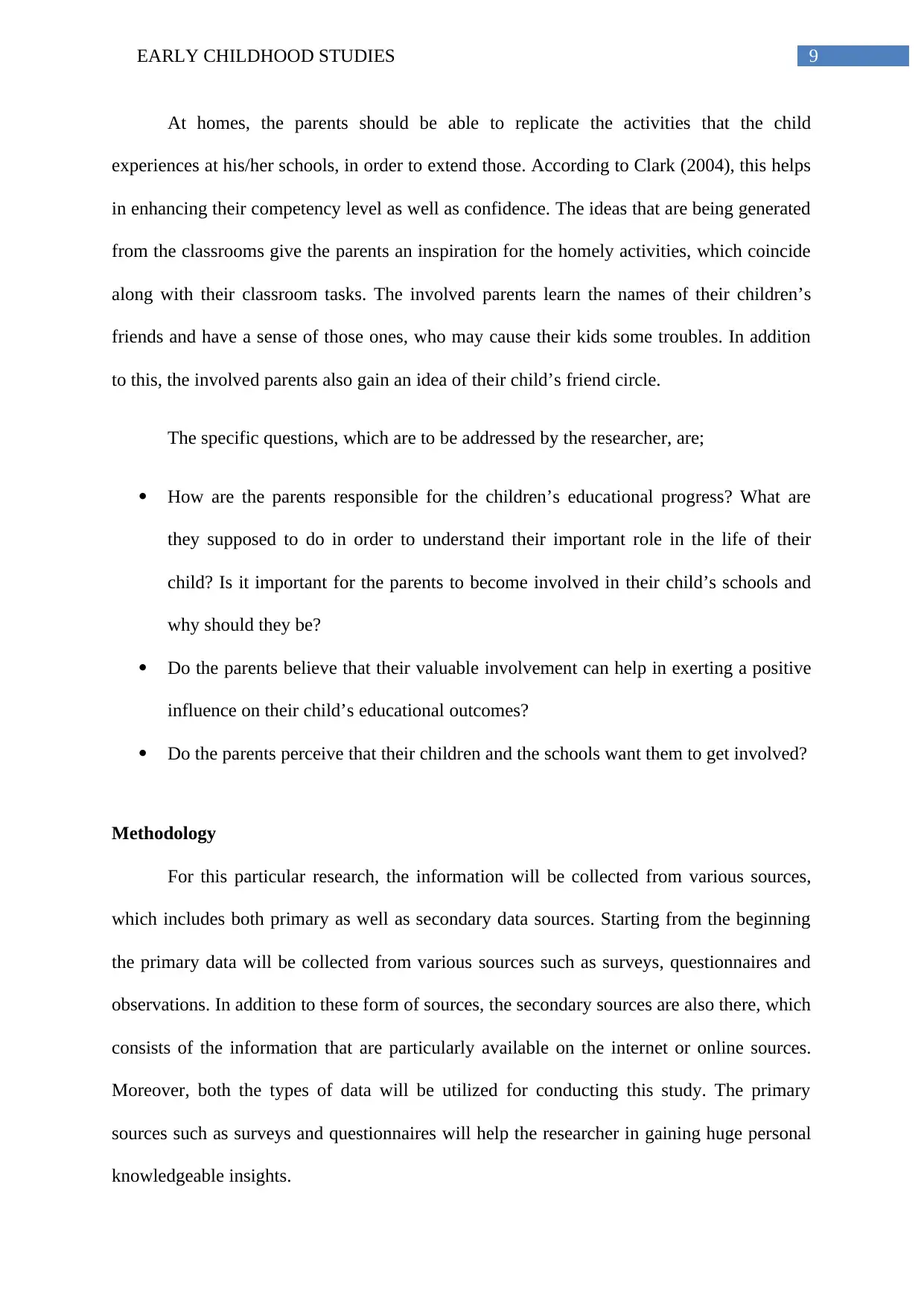
9EARLY CHILDHOOD STUDIES
At homes, the parents should be able to replicate the activities that the child
experiences at his/her schools, in order to extend those. According to Clark (2004), this helps
in enhancing their competency level as well as confidence. The ideas that are being generated
from the classrooms give the parents an inspiration for the homely activities, which coincide
along with their classroom tasks. The involved parents learn the names of their children’s
friends and have a sense of those ones, who may cause their kids some troubles. In addition
to this, the involved parents also gain an idea of their child’s friend circle.
The specific questions, which are to be addressed by the researcher, are;
How are the parents responsible for the children’s educational progress? What are
they supposed to do in order to understand their important role in the life of their
child? Is it important for the parents to become involved in their child’s schools and
why should they be?
Do the parents believe that their valuable involvement can help in exerting a positive
influence on their child’s educational outcomes?
Do the parents perceive that their children and the schools want them to get involved?
Methodology
For this particular research, the information will be collected from various sources,
which includes both primary as well as secondary data sources. Starting from the beginning
the primary data will be collected from various sources such as surveys, questionnaires and
observations. In addition to these form of sources, the secondary sources are also there, which
consists of the information that are particularly available on the internet or online sources.
Moreover, both the types of data will be utilized for conducting this study. The primary
sources such as surveys and questionnaires will help the researcher in gaining huge personal
knowledgeable insights.
At homes, the parents should be able to replicate the activities that the child
experiences at his/her schools, in order to extend those. According to Clark (2004), this helps
in enhancing their competency level as well as confidence. The ideas that are being generated
from the classrooms give the parents an inspiration for the homely activities, which coincide
along with their classroom tasks. The involved parents learn the names of their children’s
friends and have a sense of those ones, who may cause their kids some troubles. In addition
to this, the involved parents also gain an idea of their child’s friend circle.
The specific questions, which are to be addressed by the researcher, are;
How are the parents responsible for the children’s educational progress? What are
they supposed to do in order to understand their important role in the life of their
child? Is it important for the parents to become involved in their child’s schools and
why should they be?
Do the parents believe that their valuable involvement can help in exerting a positive
influence on their child’s educational outcomes?
Do the parents perceive that their children and the schools want them to get involved?
Methodology
For this particular research, the information will be collected from various sources,
which includes both primary as well as secondary data sources. Starting from the beginning
the primary data will be collected from various sources such as surveys, questionnaires and
observations. In addition to these form of sources, the secondary sources are also there, which
consists of the information that are particularly available on the internet or online sources.
Moreover, both the types of data will be utilized for conducting this study. The primary
sources such as surveys and questionnaires will help the researcher in gaining huge personal
knowledgeable insights.
Paraphrase This Document
Need a fresh take? Get an instant paraphrase of this document with our AI Paraphraser
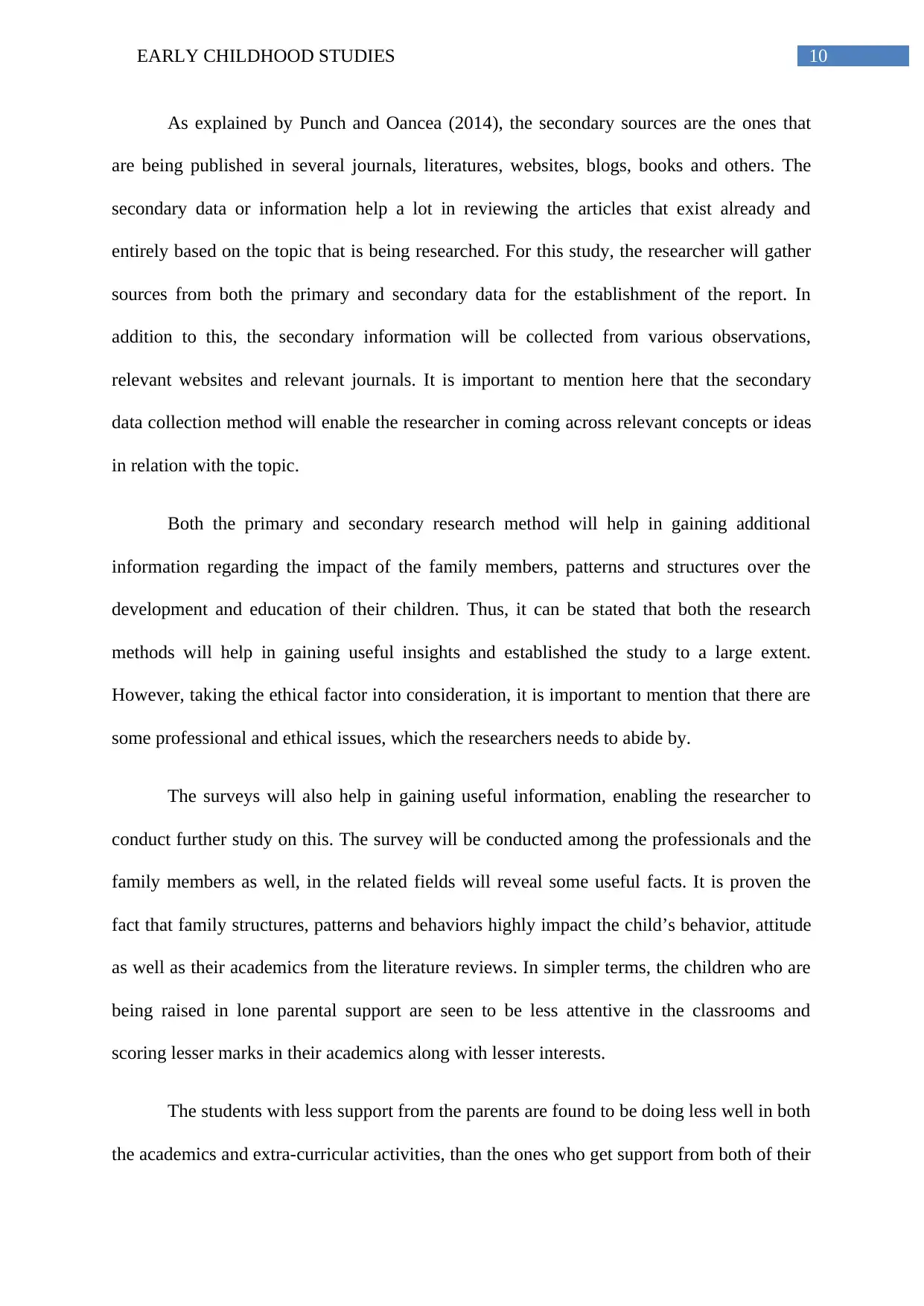
10EARLY CHILDHOOD STUDIES
As explained by Punch and Oancea (2014), the secondary sources are the ones that
are being published in several journals, literatures, websites, blogs, books and others. The
secondary data or information help a lot in reviewing the articles that exist already and
entirely based on the topic that is being researched. For this study, the researcher will gather
sources from both the primary and secondary data for the establishment of the report. In
addition to this, the secondary information will be collected from various observations,
relevant websites and relevant journals. It is important to mention here that the secondary
data collection method will enable the researcher in coming across relevant concepts or ideas
in relation with the topic.
Both the primary and secondary research method will help in gaining additional
information regarding the impact of the family members, patterns and structures over the
development and education of their children. Thus, it can be stated that both the research
methods will help in gaining useful insights and established the study to a large extent.
However, taking the ethical factor into consideration, it is important to mention that there are
some professional and ethical issues, which the researchers needs to abide by.
The surveys will also help in gaining useful information, enabling the researcher to
conduct further study on this. The survey will be conducted among the professionals and the
family members as well, in the related fields will reveal some useful facts. It is proven the
fact that family structures, patterns and behaviors highly impact the child’s behavior, attitude
as well as their academics from the literature reviews. In simpler terms, the children who are
being raised in lone parental support are seen to be less attentive in the classrooms and
scoring lesser marks in their academics along with lesser interests.
The students with less support from the parents are found to be doing less well in both
the academics and extra-curricular activities, than the ones who get support from both of their
As explained by Punch and Oancea (2014), the secondary sources are the ones that
are being published in several journals, literatures, websites, blogs, books and others. The
secondary data or information help a lot in reviewing the articles that exist already and
entirely based on the topic that is being researched. For this study, the researcher will gather
sources from both the primary and secondary data for the establishment of the report. In
addition to this, the secondary information will be collected from various observations,
relevant websites and relevant journals. It is important to mention here that the secondary
data collection method will enable the researcher in coming across relevant concepts or ideas
in relation with the topic.
Both the primary and secondary research method will help in gaining additional
information regarding the impact of the family members, patterns and structures over the
development and education of their children. Thus, it can be stated that both the research
methods will help in gaining useful insights and established the study to a large extent.
However, taking the ethical factor into consideration, it is important to mention that there are
some professional and ethical issues, which the researchers needs to abide by.
The surveys will also help in gaining useful information, enabling the researcher to
conduct further study on this. The survey will be conducted among the professionals and the
family members as well, in the related fields will reveal some useful facts. It is proven the
fact that family structures, patterns and behaviors highly impact the child’s behavior, attitude
as well as their academics from the literature reviews. In simpler terms, the children who are
being raised in lone parental support are seen to be less attentive in the classrooms and
scoring lesser marks in their academics along with lesser interests.
The students with less support from the parents are found to be doing less well in both
the academics and extra-curricular activities, than the ones who get support from both of their
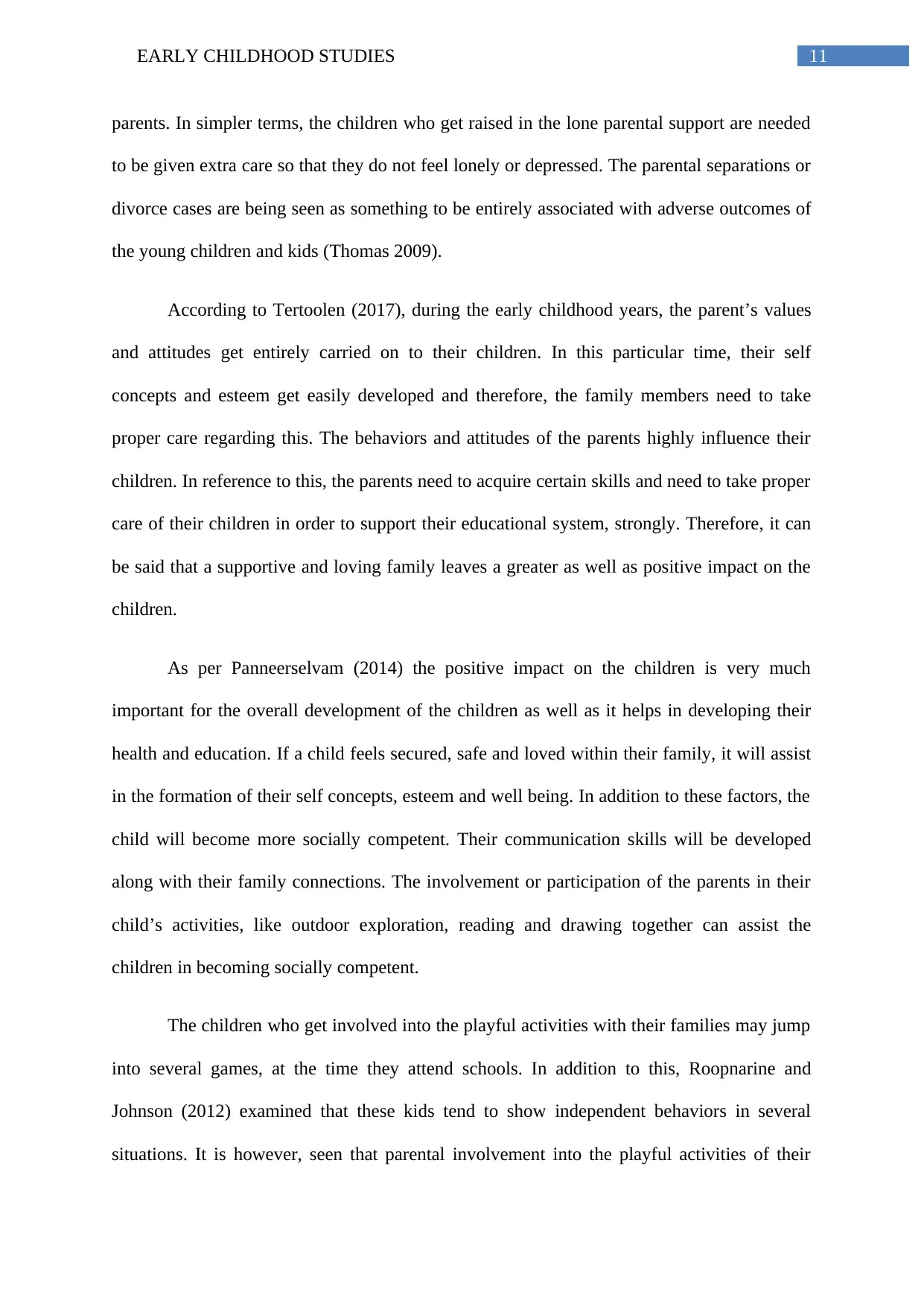
11EARLY CHILDHOOD STUDIES
parents. In simpler terms, the children who get raised in the lone parental support are needed
to be given extra care so that they do not feel lonely or depressed. The parental separations or
divorce cases are being seen as something to be entirely associated with adverse outcomes of
the young children and kids (Thomas 2009).
According to Tertoolen (2017), during the early childhood years, the parent’s values
and attitudes get entirely carried on to their children. In this particular time, their self
concepts and esteem get easily developed and therefore, the family members need to take
proper care regarding this. The behaviors and attitudes of the parents highly influence their
children. In reference to this, the parents need to acquire certain skills and need to take proper
care of their children in order to support their educational system, strongly. Therefore, it can
be said that a supportive and loving family leaves a greater as well as positive impact on the
children.
As per Panneerselvam (2014) the positive impact on the children is very much
important for the overall development of the children as well as it helps in developing their
health and education. If a child feels secured, safe and loved within their family, it will assist
in the formation of their self concepts, esteem and well being. In addition to these factors, the
child will become more socially competent. Their communication skills will be developed
along with their family connections. The involvement or participation of the parents in their
child’s activities, like outdoor exploration, reading and drawing together can assist the
children in becoming socially competent.
The children who get involved into the playful activities with their families may jump
into several games, at the time they attend schools. In addition to this, Roopnarine and
Johnson (2012) examined that these kids tend to show independent behaviors in several
situations. It is however, seen that parental involvement into the playful activities of their
parents. In simpler terms, the children who get raised in the lone parental support are needed
to be given extra care so that they do not feel lonely or depressed. The parental separations or
divorce cases are being seen as something to be entirely associated with adverse outcomes of
the young children and kids (Thomas 2009).
According to Tertoolen (2017), during the early childhood years, the parent’s values
and attitudes get entirely carried on to their children. In this particular time, their self
concepts and esteem get easily developed and therefore, the family members need to take
proper care regarding this. The behaviors and attitudes of the parents highly influence their
children. In reference to this, the parents need to acquire certain skills and need to take proper
care of their children in order to support their educational system, strongly. Therefore, it can
be said that a supportive and loving family leaves a greater as well as positive impact on the
children.
As per Panneerselvam (2014) the positive impact on the children is very much
important for the overall development of the children as well as it helps in developing their
health and education. If a child feels secured, safe and loved within their family, it will assist
in the formation of their self concepts, esteem and well being. In addition to these factors, the
child will become more socially competent. Their communication skills will be developed
along with their family connections. The involvement or participation of the parents in their
child’s activities, like outdoor exploration, reading and drawing together can assist the
children in becoming socially competent.
The children who get involved into the playful activities with their families may jump
into several games, at the time they attend schools. In addition to this, Roopnarine and
Johnson (2012) examined that these kids tend to show independent behaviors in several
situations. It is however, seen that parental involvement into the playful activities of their
⊘ This is a preview!⊘
Do you want full access?
Subscribe today to unlock all pages.

Trusted by 1+ million students worldwide
1 out of 17
Related Documents
Your All-in-One AI-Powered Toolkit for Academic Success.
+13062052269
info@desklib.com
Available 24*7 on WhatsApp / Email
![[object Object]](/_next/static/media/star-bottom.7253800d.svg)
Unlock your academic potential
Copyright © 2020–2026 A2Z Services. All Rights Reserved. Developed and managed by ZUCOL.





